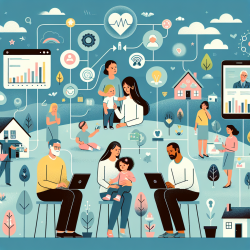Introduction
The COVID-19 pandemic has undeniably transformed the landscape of work and life, presenting unique challenges that demand innovative solutions. As practitioners in the field of speech-language pathology, understanding and applying emotion regulation strategies can be pivotal in fostering resilience and positive outcomes, especially for children. This blog draws insights from the research article "Taking control amidst the chaos: Emotion regulation during the COVID-19 pandemic?" to guide practitioners in enhancing their skills and encouraging further exploration into this critical area.
Understanding Emotion Regulation
Emotion regulation refers to the processes through which individuals influence their emotions, how they experience them, and how they express them. Effective emotion regulation is associated with numerous benefits, including improved psychological well-being, better social interactions, and enhanced career adaptability. In the context of the COVID-19 pandemic, these skills are more crucial than ever.
Implementing Emotion Regulation Strategies
Practitioners can implement several emotion regulation strategies to improve their professional skills and support their clients:
- Active Coping: Encourage clients to engage in activities that boost their mood, such as hobbies or exercise. This proactive approach can help manage negative emotions effectively.
- Problem-Solving: Guide clients in identifying problems and developing actionable solutions. This fosters a sense of control and reduces feelings of helplessness.
- Social Support: Facilitate connections with supportive networks, whether family, friends, or support groups. Social interactions can buffer against stress and enhance emotional well-being.
Emotion Regulation and Career Adaptability
The ability to regulate emotions effectively also enhances career adaptability. In uncertain job markets, such as those exacerbated by the pandemic, practitioners can help clients build resilience by focusing on:
- Career Planning: Encourage clients to explore and plan their career paths actively, even amidst uncertainty.
- Skill Development: Promote continuous learning and skill enhancement to increase employability and confidence.
- Emotional Intelligence: Cultivate emotional intelligence to improve decision-making and adaptability in changing environments.
Balancing Work and Family Responsibilities
The pandemic has blurred the lines between work and home life, creating additional stress. Emotion regulation can help manage these demands by:
- Setting Boundaries: Encourage clients to establish clear boundaries between work and family time to reduce role conflict.
- Mindfulness Practices: Introduce mindfulness techniques to help clients remain present and manage stress effectively.
- Empathy and Communication: Foster open communication and empathy within families to support mutual understanding and cooperation.
Encouraging Further Research
While current research provides valuable insights into emotion regulation, there is a need for further exploration, particularly concerning its impact on different demographic groups and in various professional settings. Practitioners are encouraged to contribute to this growing body of knowledge by conducting studies and sharing findings with the broader community.
To read the original research paper, please follow this link: Taking control amidst the chaos: Emotion regulation during the COVID-19 pandemic?










